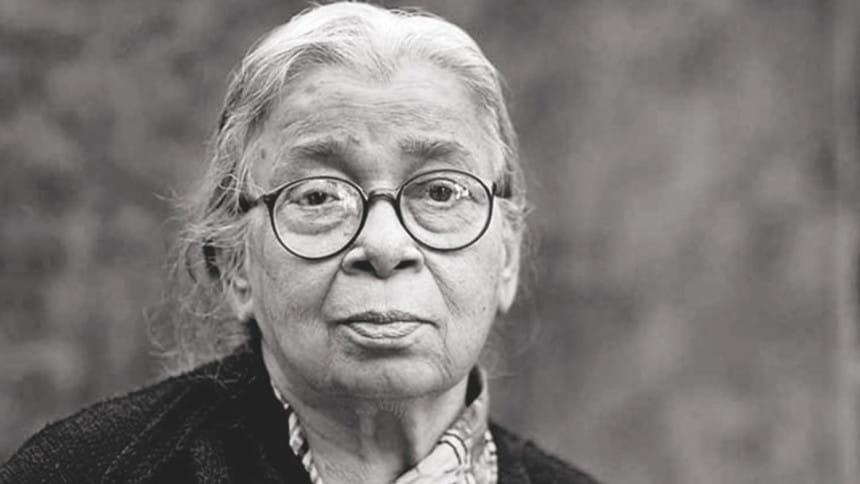The Mother of Thousand Eighty Four

On July 28, 2016, we lost a mother – a mother who taught us to dream, who coached us to speak for the rights of others and passionately fought for women's rights. She never had a large media presence, never wanted to be a celebrity. What she wanted was to raise her pen for the discriminated and neglected mass. Most of her life, she fought for oppressed indigenous people. Her fiction based on India's Shabar tribe gave her the title, 'Marang-Dai,' meaning 'the mother'. For ninety years, Mahasweta Devi walked on to listen to the mass' concern, which she amplified through her novels and brought them to the consideration of the mainstream. It is of great sorrow that her path has come to an end.
Born on 14 January; 1928, Mahasweta Devi came from a family of littérateurs. Her introduction to literature started from an early age, as her father was Manish Ghatak, a well known poet and novelist of the Kallol movement (The first conscious literary movement to embrace modernism in Bangla literature). She was also the niece of renowned film maker and activist Ritwik Ghatak.
Though she was brought up in a middle class family, Mahasweta Devi had cast off the privileges she was born into, and chose to live simply. In more than 100 novels and short stories, she wrote of India's tribal communities and Maoist rebels, prostitutes and nomads, beggars and labourers. Her first novel titled Jhansir Rani, based on a biography of the queen of Jhansi, was published in 1956.

One of her most distinguished novels is Hajar Churashir Ma, a book that is praised by every Bangla literature enthusiasts. The story of a mother (Shujata) who's son (Broti) was brutally killed by the state because of his leftist ideology. It was written in 1974 on the backdrop of the Naxalite revolution in the seventies. The book showcases Mahasweta Devi's stand on the so called democratic authority and offers a magnificent narration of how wealth and power demolished the revolutionaries in such way that it was almost evil. In an interview where Mahasweta Devi was asked where she got the influence for the character Broti, she replied that it was the direct impact of her own son Nabarun Bhattacharya— famous Indian Bengali writer who was committed to revolution and radical writing aesthetics. A question might arise regarding why this book was received so well by the readers. The subject of this book is very complicated, as it glorifies the leftist movement and shouts hatred towards the capitalist mentality. So, was it Mahaswata Devi's amazing writing skills for which the book did so well? Or was it the fact that the mass still unconsciously hopes for an equal life, which capitalism fails to provide? This depends solely on the readers interpretation, nonetheless the novel is one of the best works of modern literature.
Mahasweta Devi's personality as an activist always overthrows her identity as a writer. She herself turned the world's attention from her literature to her social and political life, allowing herself to be called "the mother of the Shabars". To compensate for both, she put the two identities together, creating outstanding works such as 'The Hunt,' a short story.
Though she is widely known for being an activist and a writer, lets look at the lesser known Mahasweta— a children's writer. In the 1960s, for nearly a decade, she wrote for Mouchak, a Bangali children's magazine. Mahasweta also wrote for Sandesh, another famous children's magazine, at the invitation of its editor, Satyajit Ray. Along with hilarious tales for Sandesh, she was writing the stories that would make up Agnigarbha (Womb of Fire).
"The right to dream should be the first fundamental right," Mahasweta devi once said at the Jaipur Literally Festival in 2013. Was she at all wrong? It was her dreams that came out through her novels-- dreams of equality, dreams of civil rights, and dreams of revolution. Mahasweta Devi may have physically left the world, but she left the '1084' (Hajar Churashi) children who will forever be in debt to her, as she showed them their right to dream.

 For all latest news, follow The Daily Star's Google News channel.
For all latest news, follow The Daily Star's Google News channel. 



Comments